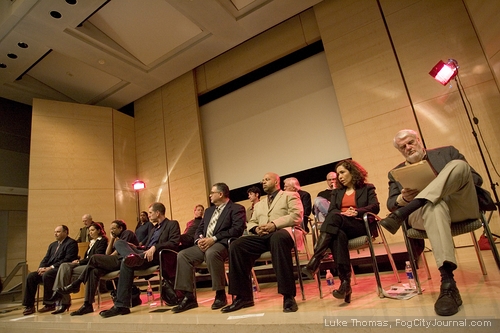
A panel of media industry professionals was convened Tuesday
to discuss the San Francisco Chronicle’s financial troubles
and the general decline of newspaper circulation.
Photos by Luke Thomas
By Fanny Dassie
March 20, 2009
As the US newspaper industry’s future is gripped by uncertainty with the 150-year-old Rocky Mountain News publishing its final print edition on February 27th and the 146-year-old Seattle Post-Intelligencer closing its print edition Monday, the Northern California Chapter of the Society of Professional Journalists (SPJ) convened a town-hall styled panel of journalists, publishers and editors at the San Francisco Public Library, Tuesday, to discuss the future of the San Francisco Chronicle and print journalism.
The Hearst Corporation, which bought the Chronicle in 2000, recently announced that it would be forced to shut down the 144-year old newspaper unless substantial concessions from unions and staff can be made. Hearst says the newspaper lost $50 million in 2008 and continues to lose as much as $1 million per week, though this information cannot be verified.
“We came here to save our newspaper,” said Joseph Ramelo, a 27-year-old city employee. “The Chronicle has been around for so long, it would be weird if it was to disappear. It is such an institution.”
Dr. David Robinson from the Haas School of Business explained the economic recession, the availability of free online content, and Craigslist – are factors contributing to the Chronicle’s decline.
“Giving the content away for free on SFGate.com is not a prudent business model,” Robinson added.
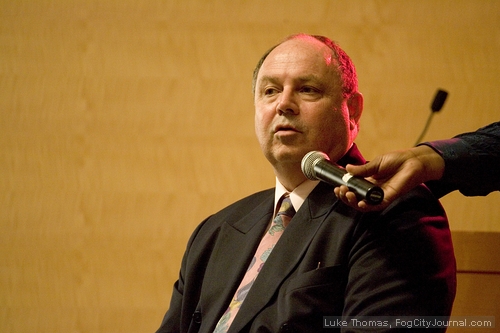
David Robinson
Audience participants said they would be willing to pay for online content if such a move would help save the Chronicle from shuttering.
David Weir, a veteran journalist and co-founder of the Center for Investigative Reporting, said the Internet is replacing traditional newspaper journalism.
“We are living in a time where our entire society has been transformed. Everything is going to have to change,” he said. “Blaming the Internet for what’s happening to the Chronicle is, in my eyes, ludicrous.”
Weir said he and others predicted 15 years ago “that unless the management of papers like the Chronicle aggressively started adapting then, this day would come.”
“It gives me no joy to have been right about it,” he said, and blamed management for lacking “vision” and “will” and for failing to invest in proprietary online content protection mechanisms.
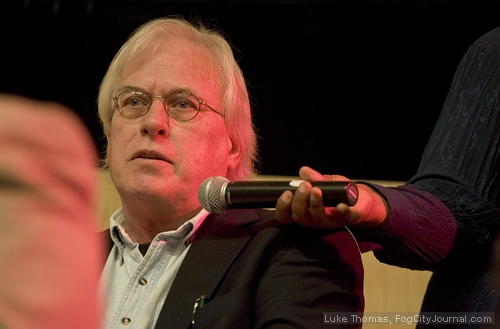
David Weir
The belief that the Chronicle is doing too little, too late was echoed by Robinson who said the crisis has nothing “to do with the capital structure, with the investment situation. As an investment decision, they should have pulled the plug perhaps two years ago.”
Relevance and content quality was also an issue for some audience members. They complained the Chronicle lacked investigative reporting, the cornerstone of journalism. Former Chronicle reporter Josh Wilson criticized the newspaper for lowering its standard in fair political reporting, citing the 2007 mayor’s race as an example.
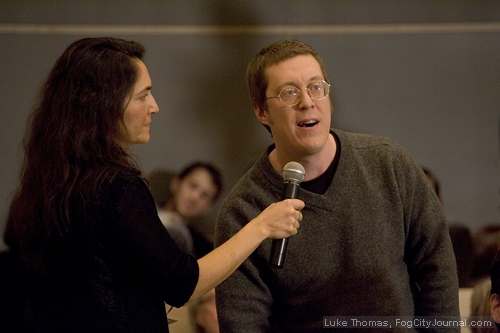
Josh Wilson
Beyond the responsibility participants would attribute to the Chronicle’s decline, panelists agreed that it is no time for finger-pointing but a time to engage in relevant action to help save the newspaper.
Carl Hall, a long-time San Francisco Chronicle reporter, asked participants to look at the bigger picture.
“We are not feeling sorry for ourselves,” he said. “We need to look at what is important – save journalism… Journalism should fight for itself.”
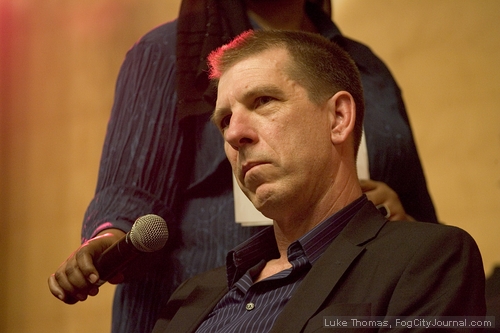
Carl Hall
Tuesday’s panel and participants presented alternative journalism models. Among them, niche reporting, non-commercial media and citizen journalism, are helping to save journalism.
David Cohn, founder of the web site Spot.Us, created a new online journalism model. Freelancers pitch their stories through the website and directly to the community which decides whether or not to make a donation to support the coverage of the story outlined.
“Spot.Us is trying to pioneer this idea of community founding reporting,” Cohn said. “We make sure the money goes directly to the reporting, to journalism.”
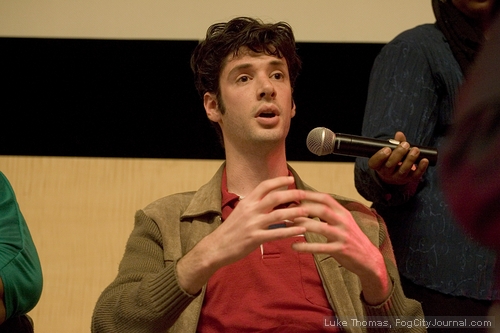
David Cohn
Volunteer journalism was mentioned as one of the possible new journalism models. Michelle Fitzhugh-Craig, news editor of Public-Press.org, a non-profit news organization, explained the San Francisco start-up relies on individual donors and grant applications to report on general-interest and under-covered issues, adding that if the non-commercial model works for radio and TV stations, it could work for newspapers as well.
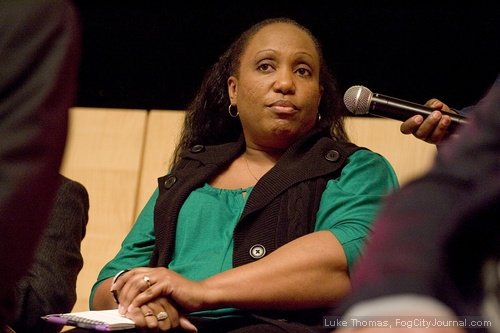
Michelle Fitzhugh-Craig
If English language newspapers around the nation are deep into the crisis, ethnic newspapers appear to have more hope for survival, especially in California.
“There is a fear of a brown nation. We are not comfortable with the other that is out there,” said Ricardo Sandoval, assistant city editor of the Sacramento Bee, adding that coverage of ethnic communities is a market that remains under-explored.
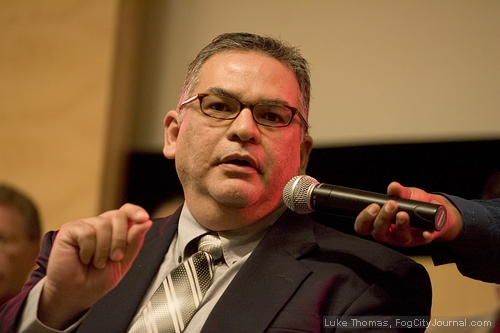
Ricardo Sandoval
Maria Antonieta Mejia, managing editor of El Mensajero, a San Francisco based newspaper written by and for the Latino population and printed in both English and Spanish, said her newspaper is surviving. The newspaper has a circulation of 103,000, managed by ten staff members.
“We have been doing not as bad as English language newspapers,” Mejia told FCJ. “We focus on local communities and respond to their needs.”
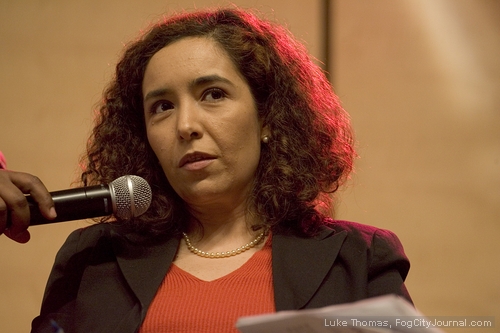
Maria Antonieta Mejia
To survive, journalism is going to have to adapt to the evolution of society and the introduction of new forms of journalism.
“Journalism is no longer a passive activity,” Cohn said. “Journalism is participatory. It requires engagement. So go out, find something you believe in and participate.”
Luke Thomas contributed to this report.


 The Hunger Site
The Hunger Site
March 20, 2009 at 9:08 pm
Like Gavin Newsom (who, to their credit, the Chronicle recently took to task for once), it promotes a bland, uninspired, dumbed down, fossilized ideology that (except for Rob Anderson and the people who leave comments on sfgate) appeals to no one — especially now that so many people have been forced to become progressives. All the other stuff is from the Associated Press which, in it’s own way, is equally unappealing.
In addition, as Tim Redmond points out, the Chronicle should be focusing mainly on local issues and ditch the pathetic national coverage and, to a lesser extent, state coverage. People read the New York and LA Times for that.
I wouldn’t mind if the Chronicle promoted a more conservative ideology, as long as it is well thought out, independent-minded, without a weasely agenda and, especially, not petty. I don’t know much about him but Arthur Bruzzone (isn’t he a Republican?) or Tony Hall might make intriguing columnists. There is a difference between Tony’s conservative ideology and the phony corporatist conservative ideology that Newsom espouses — an idealogy that any informed conservative citizen would find truly unappealing. This is why Tony and Newsom are so repulsed by each other. Newsom is dominated less by ideology and more by what his cynical handlers think will boost him (thus, themselves) to the next level. When Newsom tanks in the primaries, all the opportunists that have hitched themselves to him will abandon him and he will be left with nothing but a vapid, increasingly less fawning wife, a distressed child and money.
Anyway, I think that I might even enjoy reading what Tony Hall has to say, even if I strongly disagree with it. It might be at odds with my own opinions but at least I would feel like he is speaking as an actual person and with a conscience that I can relate to. But, of course, to truly succeed, there also needs to be balanced by at least one solid progressive voice. And a sharp investigative team that aren’t mere gossip columnists.
March 20, 2009 at 1:42 pm
This was a suicide, not a murder.
-marc
March 20, 2009 at 11:49 am
The demise of news print has more to do with the self serving one sided set agenda. What happened to the old days when there was real investigative reporting?